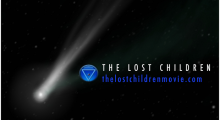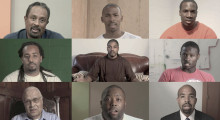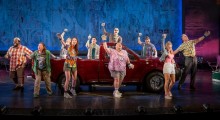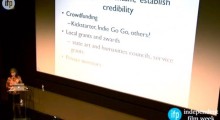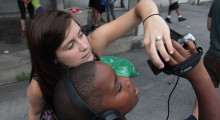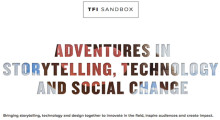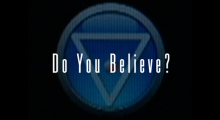Documentary
-
The New Digital Storytelling Series: Mark Harris

Mark Harris is a filmmaker and software architect. Mark writes software for gameplay, storytelling, and transmedia. Mark was a mentor at the first StoryCode StoryHack, and creative technologist on Lance Weiler’s Pandemic 1.0. Mark is also an alumnus of the IFP Narrative Lab. Mark’s transmedia project, The Lost Children, had its New York City premiere in Jan 2013 at Film Society of Lincoln Center, with a feature film and live immersive experience. In the Fall of 2012, Mark wrote his first immersive play for Epic Theater Ensemble, and in Spring 2013, Mark joins the hybrid studio/technology company Murmur. MIT Open Documentary Lab: How did you […]
by Scott Macaulay on Apr 4, 2013 -
The New Digital Storytelling Series: Kamal Sinclair

The Senior Manager at the Sundance Institute’s New Frontier Story Lab, Kamal Sinclair came to interactive via an unlikely, but, in many ways, appropriate route. While many in the interactive and new media fields hail from technology and filmmaking, Sinclair began her career in a medium where she received direct feedback from audience members every night — the theater. A trained dancer, choreographer and actress, Sinclair joined the Off-Broadway production STOMP at only 18, spending the next six years on their stages. In the below interview, Sinclair describes how she went from nightly performing to Sundance, a journey that also […]
by MIT Open Documentary Lab on Mar 28, 2013 -
Hands on a Hard Body Director S.R. Bindler On His Documentary’s Unlikely Broadway Adaptation

An odd, homemade blend of Garrison Keillor and Jackass, as filtered through an early Errol Morris-like lens, S.R. Bindler’s 1997 documentary Hands on a Hard Body is now having one of the most unexpected independent film second lives ever. Hands on a Hard Body the film has led to Hands on a Hardbody the Broadway musical, starring Keith Carradine, directed by Neil Pepe, with a book by Pulitzer-Prize winner Doug Wright and a score by Phish’s Trey Anastasio and Amanda Green. It opened at the Brooks Atkinson Theater last week, and Charles Isherwood wrote in the New York Times, “…this […]
by Scott Macaulay on Mar 28, 2013 -
IFP Masterclass: How to Fund Your Documentary

Louise Rosen is a media executive with more than a quarter-century of experience. She formed Louise Rosen Ltd. in 1996 “to specialize in setting up international television pre-sales and co-productions on behalf of independent documentary and non-fiction producers.” She has done everything from research and budgeting to distribution and management. Among her credits are Oscar, Emmy, Sundance, Prix Italia, and International Emmy award-winning projects. Suffice to say, she knows a thing or two about documentaries and getting your film made. Luckily for filmmakers without Rosen’s breadth of experience (or those who do, but can still learn a thing or two), […]
by Billy Brennan on Mar 14, 2013 -
The New Digital Storytelling Series: Elaine McMillion

Last week, Filmmaker and the MIT Open Documentary Lab kicked off their collaborative series of interviews with digital storytellers with a conversation with Zeega. (For an introduction to this entire series, read “Should Filmmakers Learn to Code,” by MIT Open Documentary Lab’s Sarah Wolozin.) In the second part in this series, Elaine McMillion talks about her work, mainly focusing on her interactive documentary Hollow, a “hybrid community participatory project and interactive documentary” that uses HTML5 to depict a West Virginia community via video, photography, soundscapes and interactive data. From her website, McMillion describes herself thusly: Elaine McMillion is a documentary storyteller […]
by MIT Open Documentary Lab on Mar 14, 2013 -
The New Digital Storytelling Series: Zeega

The first our series of interviews with digital storytellers, realized in collaboration with Filmmaker, here are the team behind the interactive storytelling platform Zeega. From the group’s mission statement: Zeega is revolutionizing web publishing and interactive storytelling for a future beyond blogs. With Zeega, you can use any media in the cloud, transform the entire screen into your playground, and share your interactive creations with the world. We’re living in a unique moment. More media than ever is recorded and shared. But the web today is dominated by a few platforms – all stories start to feel the same, trapped […]
by MIT Open Documentary Lab on Mar 7, 2013 -
TFI Sandbox for Documentary Transmedia

As transmedia has moved past its buzzword beginnings, resources and organizations have sprung up to support the creative community involved in multiplatform narratives. The latest of these comes from the Tribeca Film Institute, which last week launched an online hub for all things transmedia — particularly nonfiction — called TFI Sandbox. The name, of course, indicates a place where producers can come to play and develop techniques, strategies, and specific projects, and thus the website offers a plethora of training material as well as links, resources, and, perhaps most importantly, an open door for producers to get familiar with TFI […]
by Randy Astle on Feb 28, 2013 -
Leviathan is a Nonfiction Game-Changer

(Distributed by Cinema Guild, Leviathan opens at the IFC Center in New York City on Friday, March 1, 2013. Visit the film’s official website to learn more.) A staggering thrill-ride of an experience, built on moments of astonishing cinematic immediacy, Leviathan marks a major leap forward in nonfiction filmmaking. It’s certainly not a film all viewers will respond to, but as someone who makes documentaries, I see Leviathan as the future. The progeny of direct cinema, experimental film and ethnography, Leviathan uses new cameras and an inventive technique to create something bracingly distinctive. Directed by Lucien Castaing-Taylor and Véréna Paravel, Leviathan […]
by Robert Greene on Feb 28, 2013 -
Free the Mind Launches Distro Campaign via Indiegogo

Wanna give the finger to Big Pharma and maybe meet the Dalai Lama? Danish director Phie Ambo’s Free the Mind was one of my big discoveries at IDFA 2012. The film’s a truly revelatory exploration of the mindfulness movement, led here in the States by the University of Wisconsin’s Richard Davidson (who made Time magazine’s list of the 100 most influential people in the world back in 2006), an expert in “contemplative neuroscience” who moved into the field after being asked by none other than the Dalai Lama why modern neuroscience didn’t study kindness and compassion. Ambo’s doc is a […]
by Lauren Wissot on Feb 7, 2013 -
Immersive Storytelling for The Lost Children Pt. 4

Film as Software The final installment of this series is about the actual screening of The Lost Children feature film at Film Society of Lincoln Center. In working out this screening, I am working with a concept called “Film as Software.” What exactly does this mean? To me it means film taking on some of the qualities of software. One of those qualities is the ability to react to user input in real time. That’s my take. But I asked Mike and Hal of Murmur to join in on the discussion. Murmur is the hybrid studio/technology company handling the interactive […]
by Mark Harris on Jan 28, 2013
